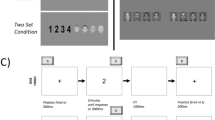Abstract
Does cognitive control operate globally (across task sets) or locally (within a task set)? Recently, two of the current co-authors (Hazeltine and Schumacher 2016; Schumacher and Hazeltine 2016) proposed that humans represent tasks as task files: hierarchically structured, compartmentalized subsets of our current goals and motivations, task instructions, and relevant stimuli and responses that are selected during task performance according to associated contextual rules. Here, we hypothesize that these task representations bound the implementation of cognitive control at distinct levels of this hierarchical structure. To investigate how task structure influences the implementation of control processes, we conducted a pair of experiments that utilized a precuing procedure. To manipulate task structure, we gave participants mappings in which two stimulus sets were either mapped so that each set was separated by response hand or both sets were interleaved across hands. In Experiment 1, participants responded to sets of images distinguished by their semantic category; in Experiment 2, they responded to sets based on different perceptual features (viz., location or color). During each experiment, precues could give information about the stimulus category or response hand for the upcoming target. The results indicate that participants with separated mappings represented the task hierarchically, while those with interleaved mappings did not. This pattern was consistent across experiments, despite the differences in the way that each set of stimuli influenced representation of the low-level task features. These findings suggest that task structure can be represented hierarchically, and that this structure supports distinct cognitive control processes at different hierarchical levels.


Similar content being viewed by others
Notes
The datasets generated during the current studies are available from the corresponding author on request.
References
Adam, J. J., Hommel, B., & Umiltà, C. (2003). Preparing for perception and action (I): The role of grouping in the response-cuing paradigm. Cognitive Psychology. https://doi.org/10.1016/s0010-0285(02)00516-9.
Adam, J. J., Hommel, B., & Umiltà, C. (2005). Preparing for perception and action (II): Automatic and effortful processes in response cueing. Visual Cognition. https://doi.org/10.1080/13506280444000779.
Akçay, Ç., & Hazeltine, E. (2007). Conflict monitoring and feature overlap: Two sources of sequential modulations. Psychonomic Bulletin & Review,14(4), 742–748. https://doi.org/10.3758/bf03196831.
Cookson, S. L., Hazeltine, E., & Schumacher, E. H. (2016). Neural representation of stimulus–response associations during task preparation. Brain Research,1648(Part A), 496–505. https://doi.org/10.1016/j.brainres.2016.08.014.
Fitts, P. M., & Seeger, C. M. (1953). S–R compatibility: Spatial characteristics of stimulus and response codes. Journal of Experimental Psychology,46(3), 199–210. https://doi.org/10.1037/h0062827.
Goodale, M. A., Milner, A. D., Jakobson, L. S., & Carey, D. P. (1991). A neurological dissociation between perceiving objects and grasping them. Nature,349(6305), 154–156. https://doi.org/10.1038/349154a0.
Goodman, D., & Kelso, J. S. (1980). Are movements prepared in parts? Not under compatible (naturalized) conditions. Journal of Experimental Psychology: General,109(4), 475–495. https://doi.org/10.1037/0096-3445.109.4.475.
Hazeltine, E., Lightman, E., Schwarb, H., & Schumacher, E. H. (2011). The boundaries of sequential modulations: Evidence for set-level control. Journal of Experimental Psychology: Human Perception and Performance,37(6), 1898.
Hazeltine, E., & Schumacher, E. H. (2016). Understanding central processes: The case against simple stimulus-response associations and for complex task representation. In B. H. Ross (Ed.), The psychology of learning and motivation (Vol. 64, pp. 195–245). San Diego, CA, US: Elsevier Academic Press.
Hick, W. E. (1952). On the rate of gain of information. The Quarterly Journal of Experimental Psychology,4, 11–26. https://doi.org/10.1080/17470215208416600.
Huang, L., & Awh, E. (2018). Chunking in working memory via content-free labels. Scientific Reports,8(1), 23. https://doi.org/10.1038/s41598-017-18157-5.
Hyman, R. (1953). Stimulus information as a determinant of reaction time. Journal of Experimental Psychology,45(3), 188–196. https://doi.org/10.1037/h0056940.
Martinez, A. M., & Benavente, R. (1998). The AR face database. CVC Technical Report, 24.
Mayr, U. (2001). Age differences in the selection of mental sets: The role of inhibition, stimulus ambiguity, and response-set overlap. Psychology and Aging,16(1), 96.
Miller, J. (1982). Discrete versus continuous stage models of human information processing: In search of partial output. Journal of Experimental Psychology: Human Perception and Performance,8(2), 273–296.
Miller, J. (1983). Can response preparation begin before stimulus recognition finishes? Journal of Experimental Psychology: Human Perception and Performance,9(2), 161–182.
Proctor, R. W., & Reeve, T. G. (1985). Compatibility effects in the assignment of symbolic stimuli to discrete finger responses. Journal of Experimental Psychology: Human Perception and Performance,11(5), 623–639. https://doi.org/10.1037/0096-1523.11.5.623.
Reeve, T., & Proctor, R. (1984). On the advance preparation of discrete finger responses. Journal of Experimental Psychology: General,10(4), 541–553.
Rogers, R. D., & Monsell, S. (1995). Costs of a predictible switch between simple cognitive tasks. Journal of Experimental Psychology: General,124(2), 207–231. https://doi.org/10.1037/0096-3445.124.2.207.
Rosenbaum, D. A. (1980). Human movement initiation: Specification of arm, direction, and extent. Journal of Experimental Psychology: General,109(4), 444.
Rosenbaum, D. A. (1983). The movement precuing technique: Assumptions, applications, and extensions. Advances in Psychology,12, 231–274.
Schumacher, E. H., Cookson, S. L., Smith, D. M., Nguyen, T. V. N., Sultan, Z., Reuben, K. E., et al. (2018). Dual-task processing with identical stimulus and response sets: Assessing the importance of task representation in dual-task interference. Frontiers in Psychology. https://doi.org/10.3389/fpsyg.2018.01031.
Schumacher, E. H., & Hazeltine, E. (2016). Hierarchical Task Representation: Task Files and Response Selection. Current Directions in Psychological Science, 25(6), 449–454. https://doi.org/10.1177/0963721416665085.
Ungerleider, L. G., & Haxby, J. V. (1994). ‘What’ and ‘where’ in the human brain. Current Opinion in Neurobiology,4(2), 157–165.
Author information
Authors and Affiliations
Corresponding author
Additional information
Publisher's Note
Springer Nature remains neutral with regard to jurisdictional claims in published maps and institutional affiliations.
Rights and permissions
About this article
Cite this article
Cookson, S.L., Hazeltine, E. & Schumacher, E.H. Task structure boundaries affect response preparation. Psychological Research 84, 1610–1621 (2020). https://doi.org/10.1007/s00426-019-01171-9
Received:
Accepted:
Published:
Issue Date:
DOI: https://doi.org/10.1007/s00426-019-01171-9




